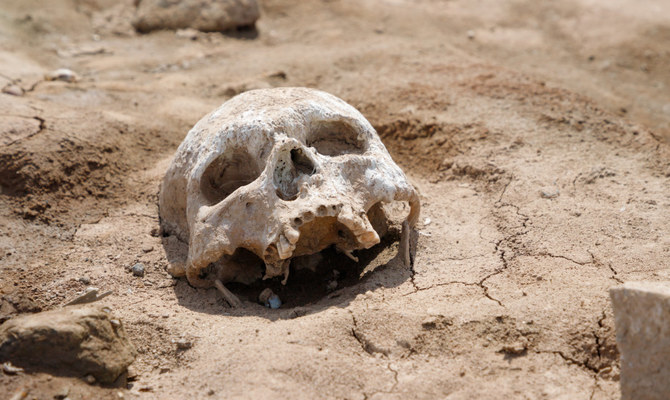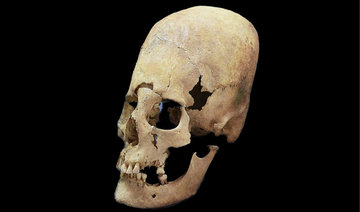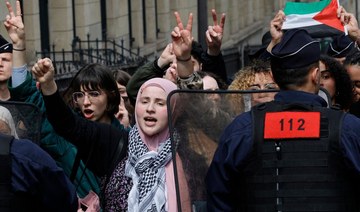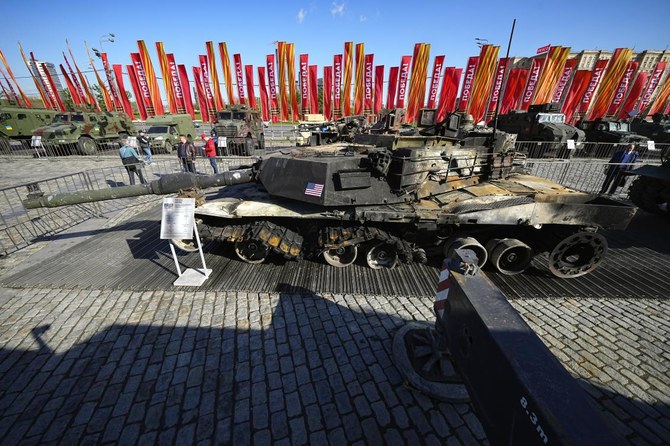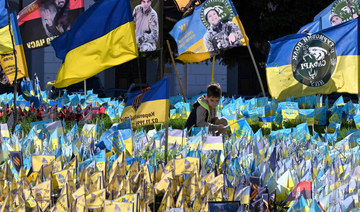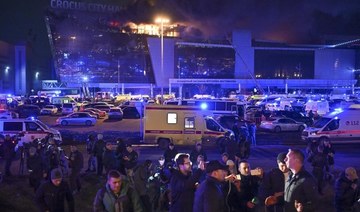YEREVAN: A phrase Armen Sarkissian likes to repeat when describing his vision for Armenia is “small nation, global state.” As president of the republic, he doesn’t mince his words when it comes to his country’s strengths, weaknesses, opportunities and threats.
Occupying only 29,743 square kilometers of territory, Armenia is comparable in size to Belgium or the US state of Maryland. However, while there are fewer than three million Armenians citizens living in his country, the Armenian diaspora worldwide is estimated to be between five and seven million — with the US alone accounting for up to 1.5 million.
Renowned for their contributions globally, including in the Arab world, Armenians have left their mark in science, politics, sports, culture and entertainment. This is probably why Sarkissian not only considers his country’s diaspora a major point of strength, but goes as far as to say that Armenians abroad are as important a national resource as oil is to Gulf countries. In fact, he believes in this idea so much that he wants his country’s constitution to change, to enable more Armenians living abroad to participate in government.
“By constitution, an Armenian from abroad cannot become a minister unless he lives four years, the last four years, in Armenia, and carries only an Armenian passport, which I consider complete nonsense in this new world,” he tells Arab News in his first interview with a Saudi media outlet. “It should be the other way around. You have to bring people that are so successful worldwide. There are hundreds of thousands of experienced people and we’re not using them. I mean, imagine a Gulf state that decided not to use oil.”
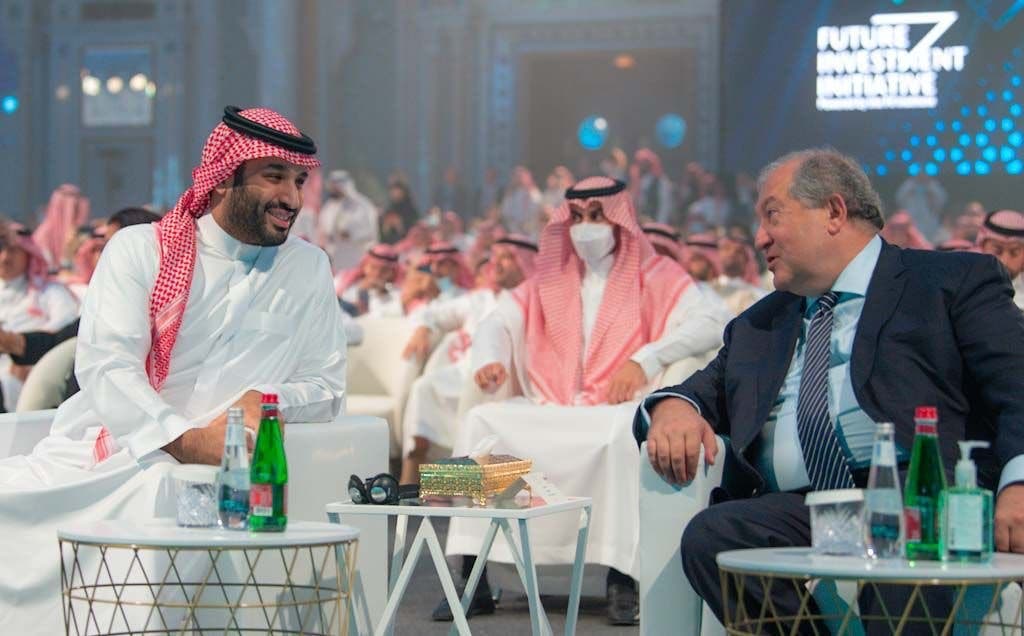
Sarkissian (right) sat next to Crown Prince Mohammed bin Salman (left) at the Future Investment Initiative conference. (SPA)
To complement this, Sarkissian also believes in investing heavily in human capital at home and is proud of what Armenia has achieved in the fields of technology and science, something he says all smart nations — such as Saudi Arabia, Qatar and the UAE — are already doing.
But despite this promising vision, the vibe is not all that positive in Yerevan, as people are acutely aware of their nation’s weaknesses and the threats it faces. The geopolitical shadows of the past seem to haunt the present — much like the eternal flame at the heart of Tsitsernakaberd, the genocide memorial dedicated to the lives of the 1.5 million Armenians who perished at the hands of the Ottoman Empire in 1915-1916.
Modern day Turkey — one of Armenia’s four neighbors, along with Iran, Georgia and Azerbaijan — still does not recognize the genocide and remains at odds with Yerevan. Last year, a second war erupted between Armenia and Azerbaijan. Yet again, the conflict was over the disputed region of Nagorno-Karabakh, internationally recognized as Azeri. Turkey publicly supported Baku, while Iran is said to have silently supported Armenia — though this is disputed by some academics and analysts in Yerevan.
The war ended with an Azeri victory and a cease-fire brokered by Russia, leaving Armenia in a struggle to prevent the harsh geopolitical realities of the present from interfering with its ambitious vision of the future.
This was a challenge for Sarkissian, but also meant discovering new — and much needed — horizons and opportunities for Armenia. One obvious opportunity was Saudi Arabia, which since last year has been advocating for a peaceful solution between Armenia and Azerbaijan.
A historic visit
Sarkissian made history in October when he became the first Armenian president to visit Saudi Arabia since the independence of his country in 1991. Although the two countries have never been mutually hostile, neither have they had diplomatic relations since Riyadh supported Azerbaijan’s position in the first Karabakh war in 1988-1994.
Sarkissian says that is “unfortunate,” and that one of his “first goals” upon becoming president in 2018 was to establish diplomatic ties with the Kingdom, which he describes as a “very important, very influential and very prominent state, the guardian of the faith of Islam.”
During his visit, Sarkissian sat next to Crown Prince Mohammed bin Salman at the Future Investment Initiative conference, often referred to as “Davos in the Desert.” He revealed to Arab News the substance of his discussions with the crown prince, which he says were not lengthy but “very specific.”
“First of all, it was a discussion about the respect of the two sides for each other as a nation, as a state, and as individuals. The second thing was that we spoke about our diplomatic relations, and we agreed that in reality our diplomatic relations started with that visit, and I’ve made invitations for the minister of state and foreign minister of Saudi Arabia, and of course His Royal Highness, to visit Armenia.

Sarkissian (left) told Abbas (right) that a timeline for exchanging ambassadors and opening embassies is a matter for the relevant departments in his government and the Saudi Foreign Ministry. (Ziyad AlArfaj)
“The third most important part of our discussion was focused on the future, and I was very happy to find in my discussions with His Royal Highness that he is very focused on the future of his country, on the future of the region, on the future of the Gulf and the future of the world.”
Sarkissian says a timeline for exchanging ambassadors and opening embassies is a matter for the relevant departments in his government and the Saudi Foreign Ministry. “To be honest, for me this is secondary, because what we agreed to is to consider that we have opened a new page in our relations,” he says.
Sarkissian regrets that his visit was limited to one day, but he met many people — and the major influencing factor for him was his conversation with the crown prince. “I do believe in his honesty as a leader and where he is leading his nation, and that’s very much in the right direction,” he says.
However, Armenia also enjoys friendly relations with Iran, a regime infamous for interfering in the affairs of its neighbors and influencing decisions to serve its interests. Would this deter any prospect of normalization of ties with Saudi Arabia and moderate Arab states? “No, not at all,” says Sarkissian. Armenia is not a religious state and already enjoys “excellent relations” with Arab countries as well as Iran, which “didn’t take the path of destroying Armenian heritage or churches —in fact the government financed the restoration of Armenian churches in Iran.”
He explains that it is in his country’s interest to maintain good relations with Tehran. “We are a landlocked state,” and Yerevan already has troubled relations with two neighbors (Turkey and Azerbaijan), so it cannot afford to upset the relationship it enjoys with the remaining two, Iran and Georgia, which he describes as his country’s gateway to Russia and the Black Sea.
Nevertheless, Sarkissian does understand what he describes as the “concerns” of Saudi Arabia. “I do understand and I see the tensions, I do understand and see Iran and the Gulf, Iran and Lebanon, OK, and I see what Saudi Arabia is doing in the region and the Gulf.”
But what exactly are the depths of the Armenian-Iranian relationship? Does Tehran play any role militarily, or interfere in security or policy affairs, as it does with almost all its neighbors?
I do understand the concerns of Saudi Arabia. I do understand and I see the tensions, I do understand and see Iran and the Gulf, Iran and Lebanon
“They don’t interfere in military or security,” Sarkissian insists. “They have their interests in what is happening now in the south of Armenia, which of course concerns Iran.” Yerevan and Tehran enjoy a relationship that is historic and cultural, and have mutual interests such as energy and trade, he says.
But what about perceptions of Tehran’s secret support for Armenia during the recent Karabakh war? And how does President Sarkissian interpret Iranian military drills near the Azeri border?
“That’s their own policy, they don’t interfere in Armenia,” he replies. “I think … if they feel a danger happening on their borders it is their internal issue.”
Sarkissian also strongly rejects suggestions that the Karabakh conflict was not just a land dispute, but also a religious war between Christian-majority Armenia and Muslim-majority Azerbaijan. “It was never a religious war,” he says. “Armenia has wonderful relations with a lot of states where Islam is a major religion, states where Islam is the only religion, or states that have Islam as their state religion”.
“The other side (referring to Azerbaijan and Turkey) sometimes like to use that (the “religious war” description) in order in order to accumulate support from Islamic world, but Armenia never tried to get support from Christian states.”
Meanwhile, several Armenian analysts have criticized what they describe as Pakistan’s open and ideological support for the Azerbaijani-Turkish axis, and say that joint military drills with the Azeri side further complicate the situation. Sarkissian says Yerevan has no diplomatic relations with Pakistan — “I’m trying to build them, because I don’t come from the concept that if somebody supports my competitor or the enemy I shouldn’t talk to him.”
“Pakistan is not a country we can ignore. We are not in a position of going to war with Pakistan, that’s complete nonsense. We should try to have a dialogue and see where it takes us, and again I don’t see any again contradiction between having a dialogue with Pakistan and our deep and good relations with India.”

Peace in the South Caucasus?
Turkish Vice President Fuat Oktay said last week that Ankara was working on advancing the dialogue with Armenia, in coordination with Azerbaijan. “Turkey stands not only for the normalization of relations with Armenia, but also for peace and stability in the entire Caucasus,” he said. Turkey has engaged in an array of regional conflicts in recent years, and its economy has now deteriorated to unprecedented levels. Although this is not the first attempt to bridge the rift between the two neighbors, many observers believe Ankara’s political and economic difficulties present a genuine opportunity for Armenia.
So, does Yerevan welcome these developments? Does this Armenian goodwill expressed by its president extend to arch-rival Turkey?
“Armenia is politically divided, especially after the war, as you can imagine,” Sarkissian says. “Every state, when you have a war and you lose the war and there are so many tensions, then it’s not homogeneous in its behavior. I would never say that I speak on behalf of all Armenians.
“I’m the president of a parliamentary republic, I’m the head of state, but I’m not the executive who runs current affairs in the government. It’s the government that has to answer to the Turkish side, and the offer.” It would be wrong for him to comment or judge at this stage, he says.
“Any agreement … should go through a formal process of being brought to the parliament,” he explains. “The moment it reaches my table you will hear my voice, and as the president of the republic I can either sign whatever is agreed — if I consider that it is in harmony with the national interest of the state and the people of Armenia — or I have a chance not sign it, and then send it, for example, to the constitutional court so the top lawyers can discuss this issue and give me advice.”
As for Azerbaijan, since the international community has recognized Karabakh as Azeri and attempts to resolve the issue continue, does Sarkissian see any role for influential regional or religious bodies such as the Gulf Cooperation Council or the Organization of Islamic Cooperation in supporting peace efforts in the Caucasus?
“My advice would be, let's try to find a logical solution that will be acceptable on both sides. Any solution that is forced will not last,” he says.
Sarkissian argues that it is the Azeris who should be offering compromises to ensure a lasting peace. “There is not much the Armenian side can compromise on today,” he says. “We could have compromised starting from 1994, when we were victorious … that was the time for compromise and to come to a diplomatic solution rather than a war solution that’s a big regret, because thousands of young lives were lost for something that could have been achieved through diplomatic channels.”
Let’s try to find a logical solution that will be acceptable on both sides. Any solution that is forced will not last
Nevertheless, the war was not a complete loss for Armenia. Sarkissian draws an interesting analogy with Turkey, and explains why there are still plenty of opportunities for his country.
“During the war, we lost. But the Armenian monetary unit — the dram — was stable. It lost a little bit, but after the war it became stronger than before. Against the US dollar, the Turkish lira went down dramatically.”
The key difference, Sarkissian says, is that Armenia has safeguarded the independence of its central bank, while Turkey has not. “There’s something we did right around the early 1990s, we rebuilt our banking sector. We had more than 150 banks, and as in every Soviet republic most of them were pyramid schemes, but we managed to bring in international banks.
“The first was HSBC, I’m proud to say I brought them here, and they helped us to build our laws into the banking sector. And in Armenia we have a central bank that is really independent from the government.”
Banking is not the only sector Sarkissian is proud of. He speaks highly of Armenia’s technology and agricultural sectors, and even his country’s natural water. Sipping from a bottle of locally sourced still water, he elaborates on how rich his country is in natural water, and insists he can distinguish between the different tastes —like a wine connoisseur.
Armenia joined the Eurasian Economic Union in 2015, but also has strong economic relations with the EU. Sarkissian says the consequent tax and customs alignments present an opportunity for Gulf companies and others to register in Armenia and run businesses from there. “Several countries, including Singapore, want to have deeper relations with the Eurasian Economic Union, and Armenia can be a gateway,” he says.
A message to the Arab world
Sarkissian recalls the key role played by the Gulf states and the Arab world in providing refuge for Armenians who escaped the 1915-1916 genocide.
“They found homes in Syria, in Lebanon, in Egypt, in the Gulf states including Saudi Arabia,” he says. “I take this opportunity to thank those nations, and the heads of state of all these Middle Eastern states, especially Arab states, that were so brotherly to us.
“These are states where the main religion is Islam, or the only religion is Islam, and they took in homeless Armenians who were Christians as their brothers and sisters. So this is an opportunity to thank them.”
Significantly, more than 100 years later, that migration is happening in reverse as Armenians flee their desperate plight in countries such as Syria and Lebanon. Sarkissian believes that, certainly in the case of Lebanon, it would be preferable to support the Armenian community in remaining in their adopted country.
“Five or ten years ago that was a country that was living in harmony,” he says. “Of course there was interference there, but what they got wrong was on the financial side, because of the structure of the constitution and the way they were running their affairs.
“But I would love to help our Armenian community there so they will stay, because there is too much culture, too much presence, and they are important — as are our Armenian communities in many other places.”









